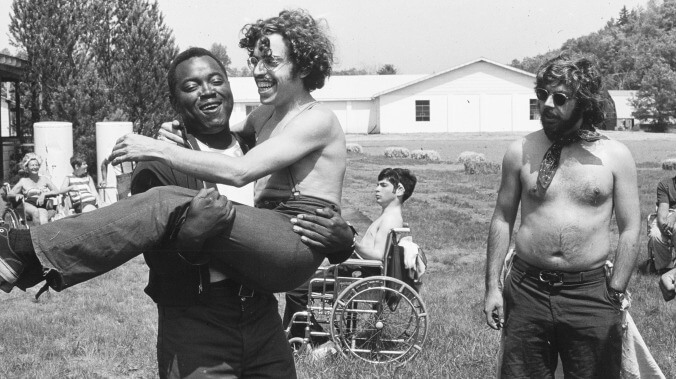Netflix’s Crip Camp is a different kind of summer camp movie


“The world wants us dead.” That statement is delivered, if not quite casually, then with startling clarity by one of the disability rights advocates interviewed in Crip Camp. Some might be shocked by the candor. But as this Netflix-released documentary makes clear, people with disabilities don’t have the luxury of being surprised by society’s indifference toward them. Able-bodied people may feel uncomfortable if a blind person doesn’t wear sunglasses or if they can’t understand the speech of someone with cerebral palsy. Now imagine being on the receiving end of that discomfort every day of your life, as disgust and pity are piled on top of constant reminders of how little the rest of the world thinks about you and your needs. A humanizing emphasis on providing those who live with these experiences the opportunity to recount them is where this otherwise conventional documentary shines.
Despite its in-your-face title, Crip Camp isn’t chiefly concerned with confronting its audience with harsh truths. Mostly, this is an empowering feel-good documentary (it won an audience award at Sundance) about a small group of people who came together in the right place at the right time. The time was the late ’60s. The place was Camp Jened, a.k.a. “Crip Camp,” in Upstate New York, described in the prologue by co-director James Lebrecht—a former attendee himself—as “a summer camp run by hippies” where “you’ll probably smoke dope with the counselors.” (“Sign me up!” he adds with a wicked grin.) Gathering teenagers with disabilities from all over the East Coast, Camp Jened only lasted for a few heady summers before it closed in 1977. But the experience of simply being in a place where difference was normal profoundly changed the lives of everyone involved.
One of those teenagers, Judith Heumann, ended up becoming a leader of the nascent disability rights movement. In recent years, there have been documentaries about the birth of movements like women’s liberation (She’s Beautiful When She’s Angry) and gay rights (The Death And Life Of Marsha P. Johnson). Crip Camp follows a similar playbook as it traces the progression of the movement from front-porch conversations at Camp Jened to the signing of the Americans With Disabilities Act Of 1990. Lebrecht and co-director Nicole Newnham hit only the major beats of this story, devoting the majority of the film’s running time to three events: the hormone-soaked utopia that was Camp Jened, the founding of the Center For Independent Living in Berkeley in 1972, and the 1973 sit-in that led to the signing of Section 504, the legislation that guarantees a public education to children with disabilities in the United States.
If you’re surprised that that right wasn’t guaranteed until 1973, then Crip Camp will serve as an enlightening look at how much has changed in the past 50 years. At one point, Lebrecht, who uses a wheelchair, tells an astonishing story about dragging himself and his wheelchair up multiple flights of steps at Grand Central Station in the early ’70s as hundreds of commuters passed him by. There were no elevators or ramps in the station at the time, because there was no law mandating that there had to be. One area where Crip Camp does fall short is in illuminating what it’s like to live with disabilities in America today. Toward the end of the film, married couple Denise and Neil Jacobson describe the ways that their lives have gotten easier since the ’60s. But only briefly does the movie touch upon the massive room for improvement that still exists. It’s an odd choice, given that Crip Camp otherwise doesn’t shy away from the harsh emotional and physical realities of living with a disability. Combined with an abrupt and jarring cut to black at the end, it’s a letdown for a documentary that’s otherwise gutsy and entertaining.
More effective is the way the directors dismantle stereotypes and advocate for solidarity among people living with different types of disabilities. Fitting for a film backed by the groovy sounds of the Grateful Dead and Bob Dylan, the biggest myth Crip Camp is out to bust is that disabled people aren’t sexual beings. Free love hit Camp Jened just as hard as it did every other anti-establishment enclave of the era, and the campers’ misadventures eventually led to an outbreak of crabs that everyone took with good humor, if the archival footage that makes up most of the film’s first half is any indication. Crip Camp looks at the past with more affection than criticism, even though life was, in many ways, more difficult for its subjects back then. And if its view of the ’60s is perhaps overly sunny, consider this: Wouldn’t you look back at the first time you felt truly seen as a human being as a magical moment in your life?